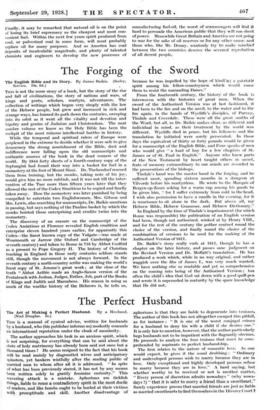The Forging of the Sword
The English Bible and its Story. By James Baikie. (Seeley, Service. 10s. 6d.) Tuts is not the mere story of a book, but the story of the rise and fall of civilizations, the story of nations and wars, of kings and poets, scholars, martyrs, adventurers. The collection of writings which began very simply with the law of the Hebrew people, but grew and increased in rich and strange ways, has burned its path down the centuries, sweeping into its orbit as it went all the vitality and devotion and bigotry and genius of Judaism and Christendom. The neat sombre volume we know as the Holy Bible has been the cockpit of the most ruinous• intellectual battles in history.
While the temporal and spiritual rulers of Europe were perplexed in the extreme to decide whether it were safe to give democracy the strong nourishment of the Bible, dust and indifference were falling upon the old manuscripts and authentic sources of the book in the dead corners of the world. By 1844 forty sheets of a fourth-century copy of the Septuagint had found their way into a basket for fuel in a monastery at the foot of Mount Sinai. Dr. Tischendorf rescued 'them from burning, but the monks, taking note of his joy, would give him no more rubbish, and it was not till the inter- vention of the Tsar more than fifteen years later that they allowed the rest of the Codex Sinaiticus to be copied and finally taken away. How the monastery was later punished by being compelled to entertain two Englishwomen, Mrs. Gibson and Mrs. Lewis, also searching for manuscripts, Dr. Baikie mentions in passing, but says nothing of the Pauline basket by which the monks hoisted those enterprising and erudite twins into the monastery.
The discovery of an erasure on the manuscript of the Codex Amiatinus at Florence revealed English erudition and enterprise eleven hundred years earlier, for apparently this Codex—the finest known copy of the Vulgate—was made at Wearmouth or Jarrow (the Oxford and Cambridge of the seventh century) and taken to Rome in 716 by Abbot Ceolfrid as a present to Pope Gregory II. The history of Christian teaching in England in those early centuries seldom stands still, though the movement is not always forward. In the seventh century a north-country scribe was making the world's finest copy of St. Jerome's great work ; at the close of the tenth " Abbot Aelfric made an Anglo-Saxon version of the Pentateuch with Joshua, Judges, Esther, Job, part of the Books of Kings and Judith and Maccabees. His reason in using so much of the warlike history of the Hebrews is, he tells us,
because he was impelled by the hope of kindriry, a patriotic spirit among his fellow-countrymen which would rouse them to resist the marauding Danes."
From the fourteenth century, the history of the book interwoven with the histories of great men. When the sword of the Authorized Version was at last fashioned, it had been to the fire and on the anvil, to the water and to the fire again, in the hands of Wycliffe's disciples, of Purvey, Tiridale and Coverdale. These were all the great smiths of the Word, but all, as Dr. Baikie makes clear, as different and individual in mind, as their treatment by the world -was different. Wycliffe died in peace, but his followers and the translation he initiated were sorely persecuted. In those days the equivalent of thirty or forty pounds would be given for a manuscript of the English Bible, and Foxe speaks of men who would give " a load of hay for a few chapters of St. James or of St. Paul in English." Anyone who knew parts of the New Testament by heart taught others in secret, feats of memory extraordinary to our minds are recorded in the prosecutions of the bishops.
Tindale's hand was the master hand in the forging, and lie suffered most, spending sixteen months in a dungeon at Vilvorde before his martyrdom. He wrote to the Marquis of Bergen-op-Zoom asking for a warm cap among his goods to be given him, " for I suffer extremely from cold in the head. I wish also permission to have a candle in the evening, for it is wearisome to sit alone in the dark. But above all, my Hebrew Bible, Hebrew Grammar, and Hebrew Dictionary."
In England by the time of Tindale's imprisonment (for which Rome was responsible) the publication of an English version had been, though not authorized, winked at by Henry VIII., and for the rest of the century the pother centred round the choice of the version, and finally round the choice of the combination of versions to be used for the making of the Authorized Version of 1611.
Dr. Baikie's story really ends at 1611, though he has a chapter on the later history, and passes sane judgment on the Revised Version and Dr. Moffatt's translation. He has produced a work which, while in no way original, and rather waggish over the fibs of James I., was very much wanted. We have nothing else so readable and yet so comprehensive on the coming into being of the Authorized Version;: too often the child's idea that God sat down with a good quill pen and wrote it is superseded in maturity by the spare knowledge that He did not.




































 Previous page
Previous page